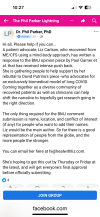Utsikt
Senior Member (Voting Rights)
I’m not able to tag Mark, but the Brurberg reference is available online. Although it doesn’t change the argument, because they didn’t find any evidence to include in their review!Vink said:They then claim that a literature search by Brurberg [11] “found no evidence that shielding patients from sensory stimuli benefited those with severe fatigue” yet this has not been published in a peer reviewed journal, nor is it available on the Internet so that others can scrutinise and read it as well.
Nina Steinkopf has pointed out a blatant lie in her recent blog post about this opinion piece:
They write:
Brurberg KG. Severe fatigue conditions and sensory deprivation—literature search. Folkehelseinstituttet (Norwegian Institute of Public Health). 2022.
https://www.fhi.no/publ/2022/alvorlige-utmattelsestilstander-og-sensorisk-deprivasjon/
As pointed out by Nina, this literature review...
They write:
14 is this:A literature review by the Norwegian Institute of Public Health found no evidence that shielding patients from sensory stimuli benefited those with severe fatigue.14
Brurberg KG. Severe fatigue conditions and sensory deprivation—literature search. Folkehelseinstituttet (Norwegian Institute of Public Health). 2022.
https://www.fhi.no/publ/2022/alvorlige-utmattelsestilstander-og-sensorisk-deprivasjon/
As pointed out by Nina, this literature review...


